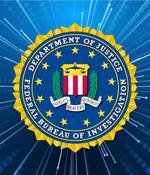Security News

Analysis The FBI's latest PR salvo, as it fights to preserve its warrantless snooping powers on Americans via FISA Section 702, is more big talk of cyberattacks by the Chinese government. During a US House subcommittee meeting last week on cyber threats from Beijing, FBI boss Christopher Wray told lawmakers that "702 is the greatest tool the FBI has to combat PRC hacking groups." PRC being People's Republic of China.

The threat actors behind the KV-botnet made "behavioral changes" to the malicious network as U.S. law enforcement began issuing commands to neutralize the activity. KV-botnet is the name given to...

Chinese Volt Typhoon state hackers failed to revive a botnet recently taken down by the FBI, which was previously used in attacks targeting critical infrastructure across the United States. After obtaining a court order authorizing it to dismantle the botnet on December 6, FBI agents took control of one of its command-and-control servers and cut off the Chinese hackers' access to the infected devices.

The FBI has disrupted the KV botnet, used by People's Republic of China state-sponsored hackers to target US-based critical infrastructure organizations. A botnet for probing critical infrastructure organizations.

China's Volt Typhoon attackers used "Hundreds" of outdated Cisco and NetGear routers infected with malware in an attempt to break into US critical infrastructure facilities, according to the Justice Department. The Feds claim the Middle Kingdom keyboard warriors downloaded a virtual private network module to the vulnerable routers and set up an encrypted communication channel to control the botnet and hide their illegal activities.

The FBI has disrupted the KV Botnet used by Chinese Volt Typhoon state hackers to evade detection during attacks targeting U.S. critical infrastructure. Devices compromised and added to this botnet included Netgear ProSAFE, Cisco RV320s, and DrayTek Vigor routers, as well as Axis IP cameras, according to Lumen Technologies' Black Lotus Labs team, who first linked the malware to the Chinese threat group in December.

Today, the FBI warned about courier services being used to collect money and valuables from victims of tech support and government impersonation scams. This public service announcement follows a surge of reports regarding criminals using couriers to collect cash or precious metals like gold or silver from victims whom the scammers instructed to sell their valuables.

Crooks are exploiting years-old vulnerabilities to deploy Androxgh0st malware and build a cloud-credential stealing botnet, according to the FBI and the Cybersecurity and Infrastructure Security Agency. Miscreants deploying Androxgh0st like to use three old CVEs in these credential-stealing attacks: CVE-2017-9841, a command injection vulnerability in PHPUnit; CVE-2018-15133, an insecure deserialization bug in the Laravel web application framework that leads to remote code execution; and CVE-2021-41773, a path traversal vulnerability in Apache HTTP Server that also leads to remote code execution.

CISA and the FBI warned today that threat actors using Androxgh0st malware are building a botnet focused on cloud credential theft and using the stolen information to deliver additional malicious payloads. "Androxgh0st is a Python-scripted malware primarily used to target.env files that contain confidential information, such as credentials for various high profile applications," the two agencies cautioned.

The ALPHV/BlackCat ransomware gang has made over $300 million in ransom payments from more than 1,000 victims worldwide as of September 2023, according to the Federal Bureau of Investigation. "ALPHV Blackcat affiliates have extensive networks and experience with ransomware and data extortion operations," the FBI says.